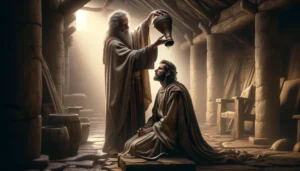As a Christian business owner or faithful worker, you understand the importance of aligning your leadership with God's will. The Kingdom Era, as depicted in the books of First and Second Samuel, as well as First and Second Kings, provides valuable insights and lessons for how to practically apply … [Read more...] about Learn How to Lead with Integrity and Humility in the Workplace for a Positive Impact on Your Business and Colleagues
Drawing Inspiration from the Books of First and Second Samuel and Kings
As a Christian business owner or faithful worker, you may find yourself seeking practical ways to apply the leadership lessons and wisdom found in the books of First Samuel, Second Samuel, First Kings, and Second Kings to your work. These ancient texts are filled with valuable insights and … [Read more...] about Drawing Inspiration from the Books of First and Second Samuel and Kings
How David’s Story Can Transform Your Business Leadership
As a Christian business owner or faithful worker, it is essential to draw on the timeless wisdom found in the books of First Samuel, Second Samuel, First Kings, and Second Kings. These books provide valuable insights into leadership, integrity, and the dynamics of influence that are still relevant … [Read more...] about How David’s Story Can Transform Your Business Leadership
The Power of Divine Guidance: How Christian Business Owners Can Seek God’s Wisdom for Successful Decision-Making
If you are a Christian business owner or a faithful worker looking to apply the leadership lessons and wisdom found in the Kingdom Era books of the Bible to your work, it is important to consider the long-term consequences of your leadership decisions. The stories of leaders such as Samuel, Saul, … [Read more...] about The Power of Divine Guidance: How Christian Business Owners Can Seek God’s Wisdom for Successful Decision-Making
How to Apply the Kingdom Era Wisdom to Create a Harmonious Work Environment
Are you a Christian business owner or a faithful worker looking to apply the leadership lessons and wisdom of the Kingdom Era found in the books of First Samuel, Second Samuel, First Kings, and Second Kings to your work environment? If so, this blog post is for you. In this post, we will explore the … [Read more...] about How to Apply the Kingdom Era Wisdom to Create a Harmonious Work Environment
Addressing Office Cliques with Courage and Integrity: Lessons from the Kingdom Era for Christian Business Owners
As a Christian business owner or faithful worker, you are no stranger to the importance of leadership and integrity in the workplace. One of the greatest sources of leadership wisdom comes from the Kingdom Era, as depicted in the books of First Samuel, Second Samuel, First Kings, and Second Kings. … [Read more...] about Addressing Office Cliques with Courage and Integrity: Lessons from the Kingdom Era for Christian Business Owners




